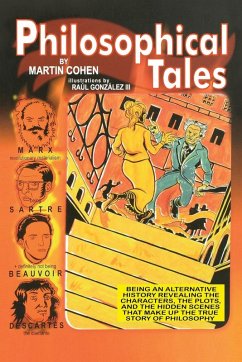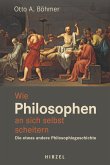Did Plato really write those Socratic Dialogues - or was it Socrates after all? Why is it doubtful that Descartes ever really uttered, "I think, therefore I am"? And what did Sartre ever have against waiters, anyway? The history of philosophy is filled with great tales - many of them fictions, misrepresentations, falsehoods, lies and fibs.
Was Socrates really the saintly figure he became for later philosophy? Why is it doubtful that Descartes ever really uttered, "I think, therefore I am"? And what did Sartre ever have against waiters, anyway? The history of philosophy is filled with great tales - many of them fictions, misrepresentations, falsehoods, lies and fibs. Or are they just misstatements, prevarications, and narratives not entirely based on fact? In the true spirit of a broad philosophical debate, Philosophical Tales dips a toe into the great sea of philosophy to collect, deconstruct, and relate many of history's great - and not so great - philosophical tales.
Enlightening and entertaining, Philosophical Tales examines a few of the fascinating biographical details of history's greatest philosophers (alas, mostly men) and highlights their contributions to the field. By applying the true philosophical approach to philosophy itself, the text provides us with a refreshing "alternative history" of philosophy.
But why should someone want to know that Kant rolled himself three times in his sheets each night before sleeping, that Schopenhauer pushed a poor old lady down the stairs, or Marx spent as much time on beer and women as he did in the British Library? By examining the seeming trivialities of philosophers' lives - and skewering a few cherished myths along the way - Philosophical Tales provides us with illuminating insights that will encourage a more active, critical way of thinking. Blaise Pascal may have put it best when he said, "To make light of philosophy is to be a true philosopher."
Hinweis: Dieser Artikel kann nur an eine deutsche Lieferadresse ausgeliefert werden.
Was Socrates really the saintly figure he became for later philosophy? Why is it doubtful that Descartes ever really uttered, "I think, therefore I am"? And what did Sartre ever have against waiters, anyway? The history of philosophy is filled with great tales - many of them fictions, misrepresentations, falsehoods, lies and fibs. Or are they just misstatements, prevarications, and narratives not entirely based on fact? In the true spirit of a broad philosophical debate, Philosophical Tales dips a toe into the great sea of philosophy to collect, deconstruct, and relate many of history's great - and not so great - philosophical tales.
Enlightening and entertaining, Philosophical Tales examines a few of the fascinating biographical details of history's greatest philosophers (alas, mostly men) and highlights their contributions to the field. By applying the true philosophical approach to philosophy itself, the text provides us with a refreshing "alternative history" of philosophy.
But why should someone want to know that Kant rolled himself three times in his sheets each night before sleeping, that Schopenhauer pushed a poor old lady down the stairs, or Marx spent as much time on beer and women as he did in the British Library? By examining the seeming trivialities of philosophers' lives - and skewering a few cherished myths along the way - Philosophical Tales provides us with illuminating insights that will encourage a more active, critical way of thinking. Blaise Pascal may have put it best when he said, "To make light of philosophy is to be a true philosopher."
Hinweis: Dieser Artikel kann nur an eine deutsche Lieferadresse ausgeliefert werden.
"We need more stories in philosophy, and Martin Cohen aims to fill this lacuna with Philosophical Tales . [This book] is intended for a general audience interested in a satirical introduction to overlooked aspects of Western philosophy and the lives of the great philosophers. Philosophical Tales does tell a number of interesting stories, and any instructor of philosophy will find it handy to have these stories available to enliven a class. Instructors will also find it valuable to use these philosophical tales to raise a compelling question: is a philosophy only as good as the philosopher who proposes it?" ( Teaching Philosophy , December 2009)
"Great philosophers only become well known after their deaths. Indeed, to speak of contemporary celebrity philosophers is oxymoronic. Still, one can t help wondering who amongst living philosophers will merit future Philosophical Tales. ( The Philosopher , Autumn 2008)
"Great philosophers only become well known after their deaths. Indeed, to speak of contemporary celebrity philosophers is oxymoronic. Still, one can t help wondering who amongst living philosophers will merit future Philosophical Tales. ( The Philosopher , Autumn 2008)








